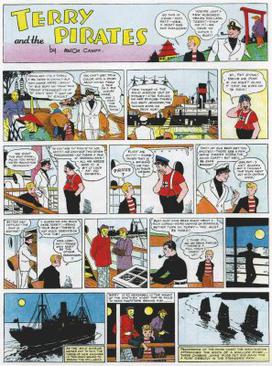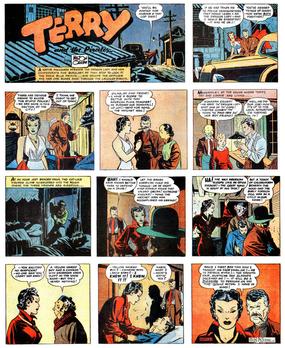Related Research Articles
Terry and the Pirates is the title of:

Terry and the Pirates is an action-adventure comic strip created by cartoonist Milton Caniff, which originally ran from October 22, 1934, to February 25, 1973. Captain Joseph Patterson, editor for the Chicago Tribune New York News Syndicate, had admired Caniff's work on the children's adventure strip Dickie Dare and hired him to create the new adventure strip, providing Caniff with the title and locale. The Dragon Lady leads the evil pirates; conflict with the pirates was diminished in priority when World War II started.

Terry and the Pirates is an American adventure series based on Milton Caniff's comic strip that was telecast from June 26 to November 21, 1953. The syndicated series ran for 18 episodes and was produced by Don Sharpe Enterprises. Canada Dry Ginger Ale was the show's original sponsor.

Milton Arthur Paul Caniff was an American cartoonist known for the Terry and the Pirates and Steve Canyon comic strips.

I Love a Mystery is an American radio drama series that aired 1939–44, about three friends who ran a detective agency and traveled the world in search of adventure. Written by Carlton E. Morse, the program was the polar opposite of Morse's other success, the long-running One Man's Family.

Steve Canyon is an American action-adventure comic strip by cartoonist Milton Caniff. Launched shortly after Caniff retired from his previous strip, Terry and the Pirates, Steve Canyon ran from January 13, 1947, until June 4, 1988. It ended shortly after Caniff's death. Caniff won the Reuben Award for the strip in 1971.

The Adventures of Superman is a long-running radio serial that originally aired from 1940 to 1951 featuring the DC Comics character Superman.

Captain Midnight is an American adventure franchise first broadcast as a radio serial from 1938 to 1949. The character's popularity throughout the 1940s and into the mid-1950s extended to serial films (1942), a television show (1954–1956), a syndicated newspaper strip, and a comic book title (1942–1948).
Male Call is an American comic strip series created and drawn by Milton Caniff on a volunteer basis, exclusively for US military publications during World War II. The strip began January 24, 1943. Caniff continued Male Call until seven months after V-J Day, bringing it to a conclusion on March 3, 1946.

Nemo, the Classic Comics Library was a magazine devoted to the history and creators of vintage comic strips. Created by comics historian Rick Marschall, it was published between 1983 and 1990 by Fantagraphics.

Dickie Dare was an adventure comic strip syndicated by AP Newsfeatures. Launched July 31, 1933, it was the first comic strip created by Milton Caniff before he began Terry and the Pirates. The strip ended on October 12, 1957.

John Daly "Jackie" Kelk was an American stage, radio, film, and television actor and stand-up comedian. He is best known for portraying the role of Homer Brown on the radio series The Aldrich Family and as the original voice of Jimmy Olsen on The Adventures of Superman.

The Dragon Lady, also known as Madam Deal, was a well-known character in the U.S. comic strip Terry and the Pirates, created by Milton Caniff, and in the movie serial, comic books, and TV series based on the comic strip. She was modelled after Lai Choi San, a real-life 20th century pirate.
Dragon Lady is usually a stereotype of certain East Asian and occasionally South Asian and/or Southeast Asian women as strong, deceitful, domineering, mysterious, and often sexually alluring. Inspired by the characters played by actress Anna May Wong, the term comes from the female villain in the comic strip Terry and the Pirates. It has since been applied to powerful women from certain regions of Asia, as well as a number of Asian and Asian American film actresses. The stereotype has generated a large quantity of sociological literature. "Dragon Lady" is sometimes applied to persons who lived before the term became part of American slang in the 1930s. "Dragon Lady" is one of two main stereotypes used to describe women, the other being "Lotus Blossoms". Lotus Blossoms tend to be the opposite of the Dragon Lady stereotype, having their character being hyper-sexualized and submissive. Dragon Lady is also used to refer to any powerful but prickly woman, usually in a derogatory fashion.

Terry and the Pirates (1940) is the 10th film serial released by Columbia. It is based on the comic strip Terry and the Pirates created by Milton Caniff. In his biography, Meanwhile..., Caniff stated that he hated the serial for changing so much of his comic strip, and that "I saw the first chapter and walked out screaming".

Bruce Gentry was an aviation adventure comic strip by Ray Bailey, distributed by the Post-Hall Syndicate. It debuted March 25, 1945, and by July the strip had expanded to 35 newspapers.
Dick Tracy was an American detective radio drama series based on the popularity of the newspaper comic strip Dick Tracy by Chester Gould.
Pepper Young's Family is a daytime drama series, with various format and title changes during its long run from 1932 to 1959. It was created and written by short story author and playwright Elaine Sterne Carrington.
Little Orphan Annie is an American radio drama series based on the popularity of the comic strip Little Orphan Annie. It debuted on Chicago's WGN in 1930, then moved to the NBC radio network Blue Network on April 6, 1931. It aired until April 26, 1942.
The Gumps is an American radio sitcom broadcast from 1931 until 1937, mostly on CBS Radio based on the popular Sidney Smith newspaper comic strip The Gumps. It was the first radio adaptation of comics.
References
- ↑ "George Lowther, TV Writer, Dead". The New York Times . April 30, 1975. Retrieved January 26, 2019.
- ↑ Reinehr, Robert C.; Swartz, Jon D. (2010). The A to Z of Old Time Radio. Scarecrow Press p. 254. ISBN 978-1-4616-7207-4.
{{cite book}}: CS1 maint: multiple names: authors list (link) - ↑ "Behind the Radio Dial," Weekly Kansas City Star, March 7, 1951, p. 12.
- ↑ Willard, Jim (March 22, 2018). "'Terry and the Pirates' once sailed over the radio waves". Reporter-Herald . Retrieved January 26, 2019.
- ↑ Cox, Jim (2003). Frank and Anne Hummert's Radio Factory: The Programs and Personalities of Broadcasting's Most Prolific Producers. McFarland p. 92. ISBN 978-0-7864-1631-8.